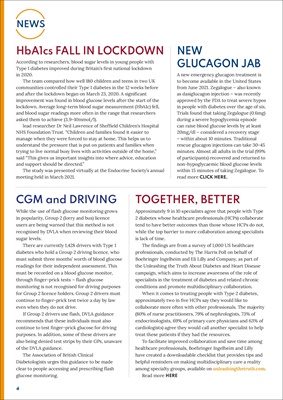
4
NEWS
HbA1cs FALL IN LOCKDOWN
According to researchers, blood sugar levels in young people with
Type 1 diabetes improved during Britain's first national lockdown
in 2020.
The team compared how well 180 children and teens in two UK
communities controlled their Type 1 diabetes in the 12 weeks before
and after the lockdown began on March 23, 2020. A significant
improvement was found in blood glucose levels after the start of the
lockdown. Average long-term blood sugar measurement (HbA1c) fell,
and blood sugar readings more often in the range that researchers
asked them to achieve (3.9-10mmol/l).
lead researcher Dr Neil Lawrence of Sheffield Children's Hospital
NHS Foundation Trust. "Children and families found it easier to
manage when they were forced to stay at home. This helps us to
understand the pressure that is put on patients and families when
trying to live normal busy lives with activities outside of the home,"
said "This gives us important insights into where advice, education
and support should be directed."
The study was presented virtually at the Endocrine Society's annual
meeting held in March 2021.
CGM and DRIVING
While the use of flash glucose monitoring grows
in popularity, Group 2 (lorry and bus) licence
users are being warned that this method is not
recognised by DVLA when reviewing their blood
sugar levels.
There are currently 1,428 drivers with Type 1
diabetes who hold a Group 2 driving licence, who
must submit three months' worth of blood glucose
readings for their independent assessment. This
must be recorded on a blood glucose monitor,
through finger-prick tests - flash glucose
monitoring is not recognised for driving purposes
for Group 2 licence holders. Group 2 drivers must
continue to finger-prick test twice a day by law
even when they do not drive.
If Group 2 drivers use flash, DVLA guidance
recommends that these individuals must also
continue to test finger-prick glucose for driving
purposes. In addition, some of these drivers are
also being denied test strips by their GPs, unaware
of the DVLA guidance.
The Association of British Clinical
Diabetologists urges this guidance to be made
clear to people accessing and prescribing flash
glucose monitoring.
NEW
GLUCAGON JAB
A new emergency glucagon treatment is
to become available in the United States
from June 2021. Zegalogue - also known
as dasiglucagon injection - was recently
approved by the FDA to treat severe hypos
in people with diabetes over the age of six.
Trials found that taking Zegalogue (0.6mg)
during a severe hypoglycemia episode
can raise blood glucose levels by at least
20mg/dl - considered a recovery stage
- within about 10 minutes. Traditional
rescue glucagon injections can take 30-45
minutes. Almost all adults in the trial (99%
of participants) recovered and returned to
non-hypoglycaemic blood glucose levels
within 15 minutes of taking Zegalogue. To
read more CLICK HERE.
TOGETHER, BETTER
Approximately 9 in 10 specialists agree that people with Type
2 diabetes whose healthcare professionals (HCPs) collaborate
tend to have better outcomes than those whose HCPs do not,
while the top barrier to more collaboration among specialists
is lack of time.
The findings are from a survey of 1,000 US healthcare
professionals, conducted by The Harris Poll on behalf of
Boehringer Ingelheim and Eli Lilly and Company, as part of
the Unleashing the Truth About Diabetes and Heart Disease
campaign, which aims to increase awareness of the role of
specialists in the treatment of diabetes and related chronic
conditions and promote multidisciplinary collaboration.
When it comes to treating people with Type 2 diabetes,
approximately two in five HCPs say they would like to
collaborate more often with other professionals. The majority
(80% of nurse practitioners, 79% of nephrologists, 73% of
endocrinologists, 69% of primary care physicians and 63% of
cardiologists) agree they would call another specialist to help
treat these patients if they had the resources.
To facilitate improved collaboration and save time among
healthcare professionals, Boehringer Ingelheim and Lilly
have created a downloadable checklist that provides tips and
helpful reminders on making multidisciplinary care a reality
among specialty groups, available on unleashingthetruth.com.
Read more HERE